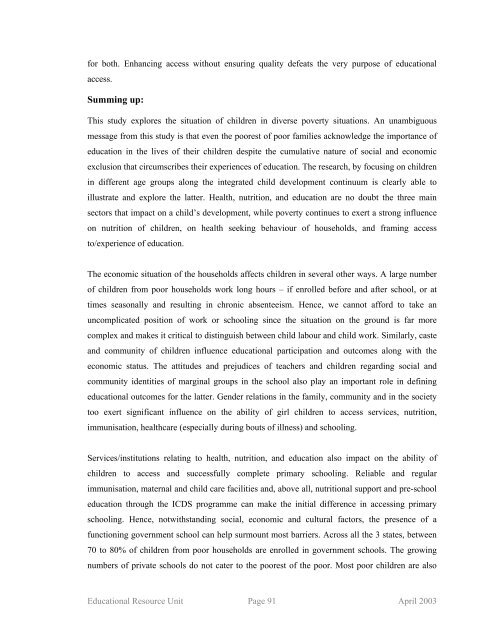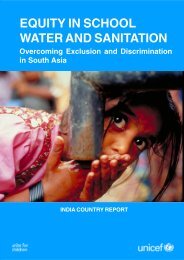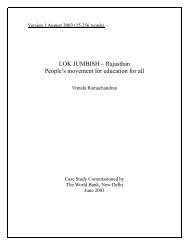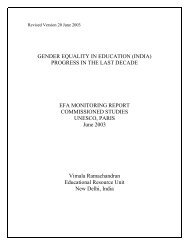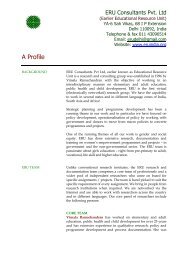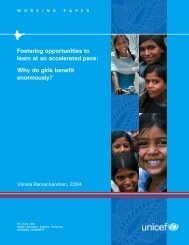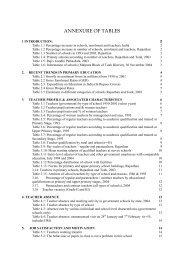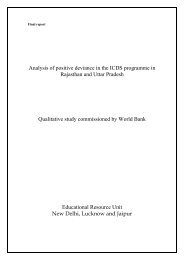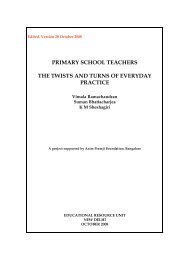Snakes and Ladders - ERU Consultants Pvt. Ltd.
Snakes and Ladders - ERU Consultants Pvt. Ltd.
Snakes and Ladders - ERU Consultants Pvt. Ltd.
Create successful ePaper yourself
Turn your PDF publications into a flip-book with our unique Google optimized e-Paper software.
for both. Enhancing access without ensuring quality defeats the very purpose of educational<br />
access.<br />
Summing up:<br />
This study explores the situation of children in diverse poverty situations. An unambiguous<br />
message from this study is that even the poorest of poor families acknowledge the importance of<br />
education in the lives of their children despite the cumulative nature of social <strong>and</strong> economic<br />
exclusion that circumscribes their experiences of education. The research, by focusing on children<br />
in different age groups along the integrated child development continuum is clearly able to<br />
illustrate <strong>and</strong> explore the latter. Health, nutrition, <strong>and</strong> education are no doubt the three main<br />
sectors that impact on a child’s development, while poverty continues to exert a strong influence<br />
on nutrition of children, on health seeking behaviour of households, <strong>and</strong> framing access<br />
to/experience of education.<br />
The economic situation of the households affects children in several other ways. A large number<br />
of children from poor households work long hours – if enrolled before <strong>and</strong> after school, or at<br />
times seasonally <strong>and</strong> resulting in chronic absenteeism. Hence, we cannot afford to take an<br />
uncomplicated position of work or schooling since the situation on the ground is far more<br />
complex <strong>and</strong> makes it critical to distinguish between child labour <strong>and</strong> child work. Similarly, caste<br />
<strong>and</strong> community of children influence educational participation <strong>and</strong> outcomes along with the<br />
economic status. The attitudes <strong>and</strong> prejudices of teachers <strong>and</strong> children regarding social <strong>and</strong><br />
community identities of marginal groups in the school also play an important role in defining<br />
educational outcomes for the latter. Gender relations in the family, community <strong>and</strong> in the society<br />
too exert significant influence on the ability of girl children to access services, nutrition,<br />
immunisation, healthcare (especially during bouts of illness) <strong>and</strong> schooling.<br />
Services/institutions relating to health, nutrition, <strong>and</strong> education also impact on the ability of<br />
children to access <strong>and</strong> successfully complete primary schooling. Reliable <strong>and</strong> regular<br />
immunisation, maternal <strong>and</strong> child care facilities <strong>and</strong>, above all, nutritional support <strong>and</strong> pre-school<br />
education through the ICDS programme can make the initial difference in accessing primary<br />
schooling. Hence, notwithst<strong>and</strong>ing social, economic <strong>and</strong> cultural factors, the presence of a<br />
functioning government school can help surmount most barriers. Across all the 3 states, between<br />
70 to 80% of children from poor households are enrolled in government schools. The growing<br />
numbers of private schools do not cater to the poorest of the poor. Most poor children are also<br />
Educational Resource Unit Page 91 April 2003


